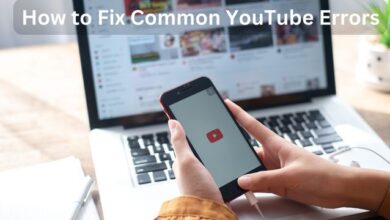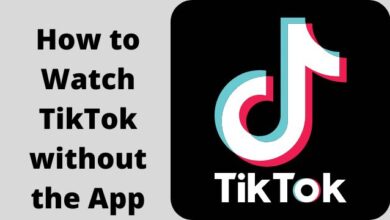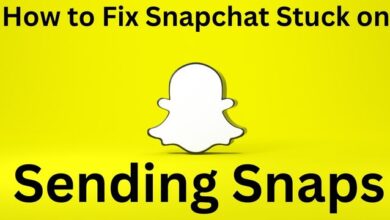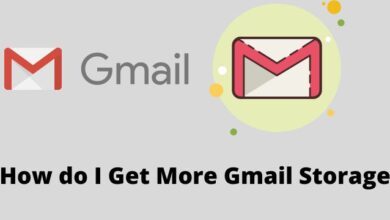Twitter is Experimenting With Hashtags
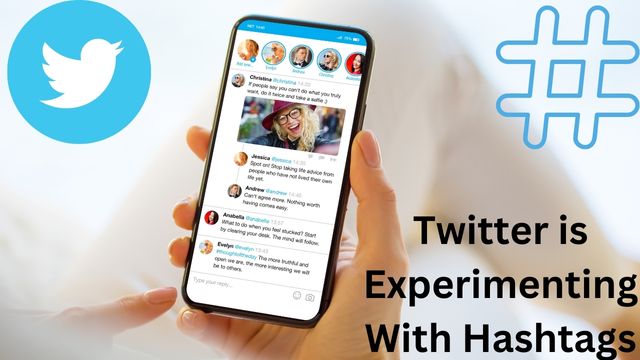
By removing the clickable feature from hashtags unless advertisers pay for it, Twitter is attempting to monetize the feature.
According to a well-known digital security researcher, it may only permit hashtags for promotional content and reserve clickable hashtags for paying clients like corporations and businesses.
Twitter is experimenting with clickable hashtags, a traditional feature that has come to characterize how users use the platform. Only sponsored hashtags, or specially generated tags that brands and corporations pay for, will be able to be clicked on by users, according to Twitter.
Except for brands and companies that pay for specialized promotional hashtags, It may make the clickable hashtag obsolete.
Twitter is Experimenting with Clickable Hashtags
Clickable hashtags play a small but significant role in how people use Twitter. Using hashtag links to click through additional tweets about specialized and narrow topics is a practical method. And they’re quite helpful for content browsing.
Famous security researcher Jane Manchun Wong shared a screenshot lately of what looks to be an experimental tweak to how hashtags function on the bird app: As Wong points out, in this instance, the adjustment reportedly entails having hashtags without clickable links.
In Wong’s screenshot, a single tweet with just a single hashtag is displayed. Additionally, Wong’s screenshot of a hashtag merely shows it as plain text rather than a clickable link because it is only a single word and is not connected to any particular company.
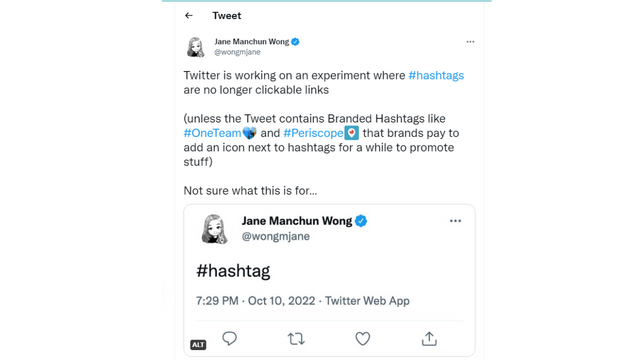
Another option to monetize Twitter might be to limit the functionality of hashtags and only permit them to be clickable in the case of paid marketing. However, if that’s what Twitter is trying out here, It seems like a strange move.
Twitter’s ability to foster communities, create movements, and keep up with our fellow humans’ messes is in large part due to hashtags. Limiting hashtags’ utility to just brands and their promotional tweets seems like a mistake.
The hashtag’s creator, Chris Messina, published a meme that sums up his opinions on Twitter’s most recent experiment.
Twitter’s clickable hashtags, or hashtags, have proven extremely important for internet culture and the platform as a whole. For good reason. Nearly all social networking networks offer this feature. For a lot of social justice campaigns to transition from the web to the offline world, hashtags were crucial.
Although there have been problems with hashtags being used for malicious purposes in the past, eliminating them is not going to solve the problem. The most devoted Twitter users won’t be happy to see such a basic feature hidden behind a fee.
Twitter clarifies that This is a brief try that is only accessible online to a select group of users. We do not intend to disable the platform’s hashtag capability.
Clickable hashtags play a small but significant role in how people use Twitter. Using hashtag links to click through additional tweets about specialized and narrow topics is a practical method. Additionally, several well-known social media platforms (like Instagram and TikTok) feature them because they’re so helpful for viewing content.
Why then would any platform, let alone Twitter, wish to test out limiting the functioning of such a feature? We are unsure. But it appears that’s exactly what’s going on. Jane Manchun Wong shared a screenshot of what appears to be an experimental tweak to the bird app’s hashtag functionality on Monday.
Apparently, in this case, the modification is having hashtags without clickable links “unless the tweet incorporates branded hashtags like #OneTeam and #Periscope,” as Wong points out.
Does Twitter work with hashtags?
On Twitter, a hashtag is created by beginning a word or phrase with the symbol “#.” A hashtag links all of the other Tweets that have used it when it is used in a Tweet. A hashtag offers your Tweet context and makes it simple for readers to follow topics that interest them.
Are hashtags counted in tweets?
Everything Matters. There are fewer characters available for your main content in a tweet the more mentions and hashtags there are because they are essential components of Twitter interactions and are not disregarded.
Do hashtags boost tweets?
On Twitter, the usefulness of hashtags is crucial for promoting your content. Adding an excessive number of pointless hashtags to Twitter posts is one of the regular blunders that most people do. Hashtags don’t operate in that way. Even with just 2 or 3 pertinent hashtags, your tweet can reach millions of people!
Should you put hashtags in comments on Twitter?
By using hashtags in your postings, you can join a discussion already taking place on that social networking site. In addition, it makes your posts prominent in that conversation, which is crucial. Greater interaction may result from this, increasing your brand’s social media activity through likes, shares, comments, and new followers.
Are hashtags only for Twitter?
Hashtags were first widely used on Twitter, but they are now often used on Facebook, Instagram, LinkedIn, Pinterest, and TikTok, among other social media sites.
What is the purpose of a hashtag?
On social media platforms, a hashtag is a label that makes it simpler to find material with a particular theme or focus. Users of social media are encouraged by hashtags to discover content that interests them. Hashtags can help associations reach their target audience and assist members in information filtering.
Can I hide my hashtags on Twitter?
Content can be hidden from the timeline, notifications, or both. Additionally, you may select whether content containing your hashtag or keyword should only come from senders you don’t know. Similar to that, you may choose to restrict content permanently or just for a specified period.
Conclusion
Twitter is testing a feature that would eliminate clickable hashtags unless corporations and marketers paid for them. Jane Manchun Wong, a security researcher, posted a screenshot of what appears to be an experimental change to the way hashtags work on the app. Users will only be allowed to click on sponsored hashtags or specially produced tags that brands and corporations pay for. Only a small number of individuals have access to the tool, which costs $5 per month to utilize. Hashtags are currently often used on Facebook, Instagram, LinkedIn, Pinterest, and TikTok, however, they were first popularly utilized on Twitter.
Finding content with a specific theme or focus is made easier by the use of hashtags, which are labels. Hashtags inspire social media users to participate.

